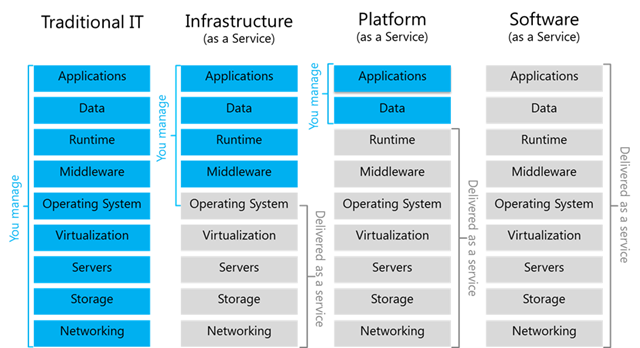In this article we will look at cloud services examples. Various examples for SaaS, PaaS and IaaS service models are provided.

SaaS Services
- Email and Office Productivity: Applications for email, word processing, spreadsheets, presentations, etc.
- Billing: Application services to manage customer billing based on usage and subscriptions to products and services.
- Customer Relationship Management (CRM): CRM applications that range from call center applications to sales force automation.
- Collaboration: Tools that allow users to collaborate in workgroups, within enterprises, and across enterprises.
- Content Management: Services for managing the production of and access to content for web-based applications.
- Document Management: Applications for managing documents, enforcing document production workflows, and providing workspaces for groups or enterprises to find and access documents.
- Financials: Applications for managing financial processes ranging from expense processing and invoicing to tax management.
- Human Resources: Software for managing human resources functions within companies.
- Sales: Applications that are specifically designed for sales functions such as pricing, commission tracking, etc.
- Social Networks: Social software that establishes and maintains a connection among users that are tied in one or more specific types of interdependency.
- Enterprise Resource Planning (ERP): Integrated computer-based system used to manage internal and external resources, including tangible assets, financial resources, materials, and human resources.
PaaS Services
- Business Intelligence: Platforms for the creation of applications such as dashboards, reporting systems, and data analysis.
- Database: Services offering scalable relational database solutions or scalable non-SQL datastores.
- Development and Testing: Platforms for the development and testing cycles of application development, which expand and contract as needed.
- Integration: Development platforms for building integration applications in the cloud and within the enterprise.
- Application Deployment: Platforms suited for general purpose application development. These services provide databases, web application runtime environments, etc.
IaaS Services
- Backup and Recovery: Services for backup and recovery of file systems and raw data stores on servers and desktop systems.
- Compute: Server resources for running cloud-based systems that can be dynamically provisioned and configured as needed.
- Content Delivery Networks (CDNs): CDNs store content and files to improve the performance and cost of delivering content for web-based systems.
- Services Management: Services that manage cloud infrastructure platforms. These tools often provide features that cloud providers do not provide or specialize in managing certain application technologies.
- Storage: Massively scalable storage capacity that can be used for applications, backups, archival, and file storage.

Suryateja Pericherla, at present is a Research Scholar (full-time Ph.D.) in the Dept. of Computer Science & Systems Engineering at Andhra University, Visakhapatnam. Previously worked as an Associate Professor in the Dept. of CSE at Vishnu Institute of Technology, India.
He has 11+ years of teaching experience and is an individual researcher whose research interests are Cloud Computing, Internet of Things, Computer Security, Network Security and Blockchain.
He is a member of professional societies like IEEE, ACM, CSI and ISCA. He published several research papers which are indexed by SCIE, WoS, Scopus, Springer and others.



Leave a Reply